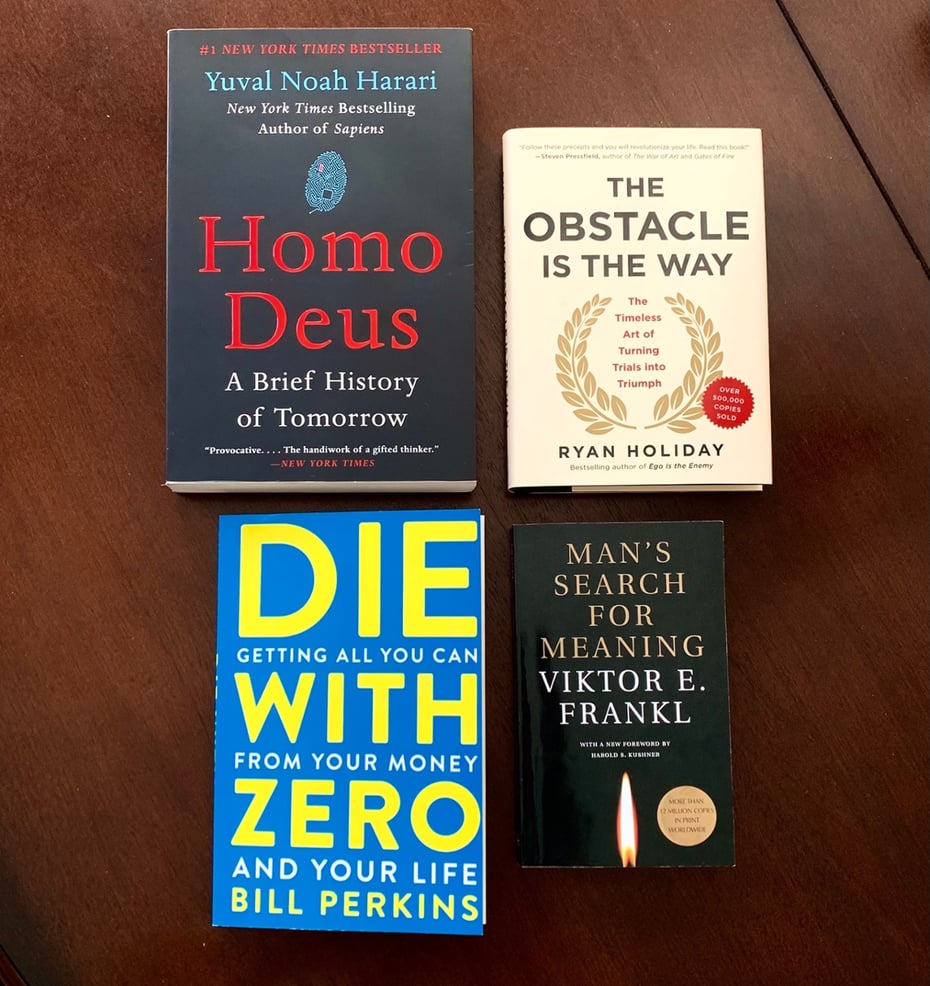What Do You Read to Clear Your Head?

I've started a spot on the bookshelf for what I call my "clear your head" collection. These are books that require a deeper level of reflection and allow me to step back and consider the full trajectory of my life.
Yes, these books tackle the existential questions like "why am I here?" and "what does it all mean?" and "will my life make difference?" But rather than depress with thoughts of our relative insignificance, I've learned to embrace what Ryan Holiday celebrates: memento mori, the ancient practice of reflection on mortality. Instead of viewing our inevitable passing as morbid or depressing, it's a realization that this kind of reflection is a great reminder to treat our time on earth as a gift and not waste it on the trivial and vain.
Of course, I'm not always in the mood for deeply introspective reads like these, but do find them especially helpful if I'm preparing for my personal retreat each year and want to get into a long-term mindset and need a greater appreciation for the journey. What books have you found put you in the right frame of mind for the long haul? Here are my top four:
One book that resonates with these themes is Man's Search for Meaning by Viktor Frankl. This profound work narrates Frankl's survival in Nazi concentration camps, where he observed how those with a strong sense of purpose were more likely to survive. His experiences led to the development of logotherapy, a psychological theory that emphasizes finding individual meaning in life. Frankl asserts that even in extreme suffering and the most challenging circumstances, people can find meaning that helps them endure. Through vivid descriptions and philosophical insights, he explores human resilience and the essential role of meaning in our lives. The book serves as a powerful reminder that our attitude and perspective can shape our experiences, even in the bleakest of times. For nonprofit leaders, Frankl's insights provide a meaningful guide to aligning work with deeper personal values, fostering a sense of purpose that can motivate and sustain their efforts. It's a thought-provoking read that offers wisdom for both personal growth and professional development.
Homo Deus: A Brief History of Tomorrow by Yuval Noah Harari explores the future of mankind in an age where artificial intelligence and biotechnology are on the rise. Harari posits that humans will evolve into a new form, "Homo Deus," where we strive to become god-like beings with the ability to shape and even create life. He examines how traditional beliefs and institutions may become obsolete as technology advances, and how these changes might affect concepts like free will and consciousness. By questioning fundamental human values, Harari challenges readers to consider what it means to be human in an era of unprecedented change. The book offers a thought-provoking look at the potential future, pushing readers to contemplate the ethics, possibilities, and challenges that lie ahead. It's a relevant read for nonprofit leaders aiming to adapt to a rapidly changing world and stay aligned with core human values.
Die With Zero: Getting All You Can from Your Money and Your Life by Bill Perkins provides a compelling perspective on money, life experiences, and the pursuit of fulfillment. Perkins argues that accumulating wealth for its own sake, without enjoying experiences and opportunities, is a misguided goal. Instead, he emphasizes the importance of spending money to create meaningful memories and experiences throughout life. The central theme is to find a balance between saving for the future and living fully in the present, so that one reaches the end of life with few regrets and a sense of having maximized life's opportunities. The book's philosophy challenges conventional financial wisdom and encourages readers to rethink their relationship with money and time. It's a valuable read for nonprofit leaders and professionals at different career stages, providing insights into aligning personal and professional goals with what truly matters in life.
Of course, Ryan Holiday's The Obstacle is the Way fits well into the reflective theme, focusing on how obstacles can become opportunities. Drawing on ancient Stoic philosophy, Holiday illustrates how challenges have shaped successful people, turning setbacks into stepping stones. The central idea is that our interpretation and response to obstacles define our path. Embracing adversity leads to growth and achievement, aligning with the understanding of life's impermanence and the philosophy of memento mori. It's an empowering book that encourages readers to focus on what they can control and to appreciate the journey, including its challenges. This perspective resonates with nonprofit leaders seeking to overcome hurdles and align their mission-driven work with deeper values.
Dr. Patton McDowell, CFRE, MBA, is the author of the best-selling Your Path to Nonprofit Leadership and host of the weekly podcast, also titled Your Path to Nonprofit Leadership. He founded PMA Nonprofit Leadership in 2009, and has coached and consulted with over 275 nonprofit organizations. A Certified Fundraising Executive and Master Trainer for AFP Global, he also serves as an Executive in Residence at Cornell University's Jeb E. Brooks School of Public Policy.
.png?width=181&height=90&name=PMA%20Brand%20Mark%201%20(1).png)

.png?width=100&height=50&name=PMA%20Brand%20Mark%201%20(1).png)
